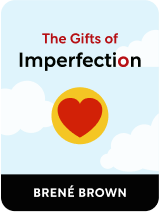

This article is an excerpt from the Shortform book guide to "The Gifts of Imperfection" by Brené Brown. Shortform has the world's best summaries and analyses of books you should be reading.
Like this article? Sign up for a free trial here .
Are you constantly analyzing yourself? Do you try to avoid or repress negative emotions? Do you feel powerless in your life?
If you answered yes to these questions, you need to learn how to be more resilient. In her book The Gifts of Imperfection, Brené Brown offers four strategies for building resilience that will lead to a better mental state and more happiness in your life.
Continue reading for Brené Brown’s advice on how to be more resilient.
Building Resilience
Brown’s next strategy for living Wholeheartedly is how to be more resilient. Brown’s research found that people who lived Wholeheartedly all had some resilience: They’d experienced struggles but had found a way to work through them.
(Shortform note: Brown’s discussion of resilience suggests that if you lack resilience, living Wholeheartedly may be more difficult. You may be more vulnerable to threats to your worthiness. Any trauma or struggle can negatively impact how you feel about yourself. If you can’t learn from and rise above those struggles, you’re in danger of feeling that you’re not worthy of a different, happier life.)
In The Gifts of Imperfection, Brown presents four strategies for generating resilience. While she presents the first three strategies as being sub-strategies of, or at least linked to, the fourth, most important strategy—embracing spirituality—it’s at times unclear how each practice connects to the theme of spirituality. For this reason, we’re going to discuss all four strategies separately:
Strategy #1: Develop Hope
You might think that hope is an emotion: the feeling of wanting something to happen. However, Brown, citing the research of the late psychologist C. R. Snyder, argues that this isn’t true. She supports Snyder’s assertion that hope is actually a way of thinking. According to Snyder, hope is a powerful combination of self-belief, goal-setting, and motivation—in other words, deciding what you want to achieve, believing you can achieve it, and having the grit to keep trying to achieve it, even in the face of challenges.
According to Brown, if we don’t cultivate hope, we run the risk of feeling powerless: like we can’t achieve our dreams or improve our lives. It’s hard to be resilient if you feel that you can’t change your life for the better.
| The Other Benefits of Hope Developing a hopeful mindset won’t just help you to build resilience: Studies have shown that hopefulness can have various health benefits, too. For instance, being hopeful may help you to live a healthier lifestyle. One study found that college students with high levels of hope were more likely to limit their fat intake and exercise regularly. Another study found that hopeful people are more likely to adopt positive weight management behaviors, such as meal planning and being mindful of meal portion size. Furthermore, a review of the literature into hope and physical health notes that hope may be linked to: Having a higher pain tolerance, being able to emotionally cope with a cancer diagnosis, accepting and coping with injury or disability, etc. Just as having hope can benefit physical health, research suggests that hopelessness can present a severe risk to health. One study found that in men, high hopelessness was linked to negative health outcomes such as cancer, heart attacks, and violent death. Furthermore, research has linked hopelessness in college students to over-consumption of alcohol and smoking. |
Strategy #2: Critically Analyze Societal Messages That Harm Resilience
As Brown notes, we constantly encounter messages in the media about what we “should” do—for example, how we should look and the products we should buy. These messages aren’t necessarily valid or realistic. For instance, a common societal message, often projected by the beauty industry, is that to be attractive, you must have clear skin and perfectly-styled hair—but this isn’t true.
However, Brown argues that if you encounter these societal expectations often enough, you may start believing that they are valid. Furthermore, you might start to judge and shame yourself for not meeting them—which will harm your resilience.
To avoid this damage to your resilience, Brown suggests practicing critical awareness. This means evaluating the media you consume and the expectations that it communicates: Are those expectations really valid or realistic? Would following them actually make your life better? Questioning the expectations will help you to realize that they’re unreasonable and that you shouldn’t try to live up to them. By keeping this in mind, you can protect your worthiness—and, consequently, your resilience.
| Which Media Gives Messages That We Should Critically Analyze? In The Gifts of Imperfection, Brown highlights television commercials as a major source of harmful societal messages that we must critically analyze. For example, many commercials feature extremely slim people who are held up as models of beauty, perpetuating the expectation that to be thin, you must be beautiful—a message that warrants analysis, since it’s arguably neither valid nor realistic. However, commercials aren’t the only source of these harmful messages. In recent years, social media has also become a leading source of damaging societal expectations that we must view critically. For instance, there are concerns that content on Instagram—a platform that hit 1 billion monthly users in 2018—promotes various standards of living that are highly unrealistic, but that users feel they must adhere to. These include unrealistic beauty standards. On Instagram, users regularly “filter” and otherwise edit their photos to make themselves look slimmer, change the size of their facial features, and remove skin blemishes. These edited posts are often held up as a standard of beauty, despite the fact that they don’t reflect reality. In fact, these standards are so unrealistic that many women would need to have plastic surgery (or at least continue to heavily edit their photos) to achieve them. Such unrealistic and invalid standards are a prime target for critical analysis: Should we really be holding ourselves to standards that no person could naturally achieve? |
Strategy #3: Refuse to Numb Negative Emotions
According to Brown, numbing is a common response to uncomfortable negative emotions. We’re afraid of feeling these emotions, so we try to “take the edge off” them—for instance, by consuming alcohol. The problem with this approach is that numbing leads to positive emotions being dulled as well as negative ones—and being unable to feel positive emotions can harm your resilience. As Brown notes, one thing that helps us to get through tough times is recalling happier times. If you’re unable to fully experience positive emotions, you won’t have as much positivity to draw on when you’re struggling.
Instead of giving in to the temptation of numbing, Brown suggests forcing yourself to feel and address your negative emotions. For example, if you’re feeling sad, allow yourself to cry and fully explore the root of your sadness: where it’s come from, and why it’s so powerful.
(Shortform note: While feeling and understanding your negative emotions may help you to process them healthily, some authors believe that dwelling on these emotions—in other words, thinking about and analyzing them for too long—may be counterproductive. For instance, Daniel Goleman argues that extensively ruminating on difficult emotions like anger and anxiety can actually increase and extend your emotional pain, rather than helping you to manage it. In other words, addressing negative emotions may be a delicate balance: Don’t ignore or numb your feelings, but don’t let them consume you for too long, either.)
Strategy #4: Embrace Spirituality
During her research, Brown found that having a deep sense of spirituality is one of the most crucial factors in cultivating resilience. She defines spirituality as recognizing the existence of a higher power that connects us all. (The “higher power” in this equation could be a religious power, such a god, but it doesn’t have to be.)
According to Brown, embracing spirituality increases resilience in a number of ways. For instance, she argues that the feeling of connection to others and a higher power that spirituality brings makes overcoming tough times feel easier. Being resilient is less challenging if you feel you’re not alone.
(Shortform note: Embracing spirituality or religion may have more benefits to mental health than just increasing resilience. According to a report by UK charity The Mental Health Foundation, research links spirituality to decreased levels of depression and anxiety. Spiritual beliefs may also aid recovery from trauma. However, the report notes that the picture isn’t clear-cut: Research indicates that some forms of spirituality, such as strict religious observance, can trigger or worsen mental health issues.)

———End of Preview———
Like what you just read? Read the rest of the world's best book summary and analysis of Brené Brown's "The Gifts of Imperfection" at Shortform .
Here's what you'll find in our full The Gifts of Imperfection summary :
- How to stop feeling like you're not "good enough"
- How shame affects your self-worth
- The 10 guideposts to living Wholeheartedly and cultivating worthiness






